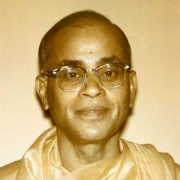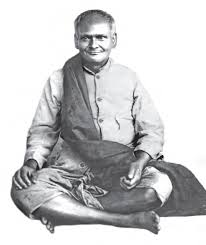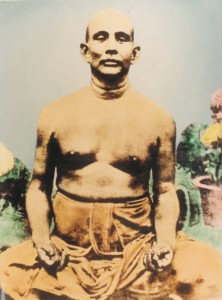From the Monastery Notebook of Swami Yogeshananda
[Posted by permission of the author.]
 Swami Shraddhananda, born in East Bengal (now Bangladesh) in 1907, was a disciple of Swami Shivananda, a direct disciple of Sri Ramakrishna. He joined the Ramakrishna Order in 1930 and lived under the close guidance of Swami Shivananda during Shivananda’s final years. Shraddhananda received Sannyasa (final monastic vows) in 1939. After serving for many years as editor of Udbodhan magazine, the Bengali-language journal of the Order, he was sent to the United States in 1957 to serve as assistant to Swami Ashokananda, head of the Vedanta Society of Northern California. When the Sacramento branch of the Society was made independent, he became its head and remained so until his passing in 1996. The author of many books, he was also a good singer and led a choir at the Sacramento Center.
Swami Shraddhananda, born in East Bengal (now Bangladesh) in 1907, was a disciple of Swami Shivananda, a direct disciple of Sri Ramakrishna. He joined the Ramakrishna Order in 1930 and lived under the close guidance of Swami Shivananda during Shivananda’s final years. Shraddhananda received Sannyasa (final monastic vows) in 1939. After serving for many years as editor of Udbodhan magazine, the Bengali-language journal of the Order, he was sent to the United States in 1957 to serve as assistant to Swami Ashokananda, head of the Vedanta Society of Northern California. When the Sacramento branch of the Society was made independent, he became its head and remained so until his passing in 1996. The author of many books, he was also a good singer and led a choir at the Sacramento Center.
On Swami Shivananda
 He was tall (about six feet) among the disciples, and fair, relatively. I first met Swami Gnaneswarananda [a disciple of Swami Brahmananda who later founded the Vivekananda Vedanta Society of Chicago] about the time I read in the paper of Maharaj’s [Swami Brahmananda’s] death (1922). I came to Calcutta in 1925 for college study and asked about Swami Shivananda, but met Swami Shuddhananda. Swami Shivananda arrived for Shivaratri [annual celebration of Shiva] from a South Indian tour. Friends and I went to Belur Math [headquarters of the Ramakrishna Order] for this. I had already met Swami Abhedananda and was leaning in his direction, for initiation and all. One friend urged that I take it from Swami Shivananda; his name became Chinmayananda. The original building, containing Swamiji’s [Swami Vivekananda’s] room, his bench etc., was a mere hut compared to the present layout of buildings.
He was tall (about six feet) among the disciples, and fair, relatively. I first met Swami Gnaneswarananda [a disciple of Swami Brahmananda who later founded the Vivekananda Vedanta Society of Chicago] about the time I read in the paper of Maharaj’s [Swami Brahmananda’s] death (1922). I came to Calcutta in 1925 for college study and asked about Swami Shivananda, but met Swami Shuddhananda. Swami Shivananda arrived for Shivaratri [annual celebration of Shiva] from a South Indian tour. Friends and I went to Belur Math [headquarters of the Ramakrishna Order] for this. I had already met Swami Abhedananda and was leaning in his direction, for initiation and all. One friend urged that I take it from Swami Shivananda; his name became Chinmayananda. The original building, containing Swamiji’s [Swami Vivekananda’s] room, his bench etc., was a mere hut compared to the present layout of buildings.
One’s first impression of Swami Shivananda was striking. He did not look very old, but strong and smiling. I felt very favorably disposed. He was a spare eater. My friend dragged me to him for introduction. “We are staying for Shivaratri,” said my friend. “Very good!” He was already in ecstasy, nearly, talking about what was to come during the night. For initiation he put me off until Vaisakh, some months later. I had brought the minimum offering, being of a rather stingy nature; how I repent that now! It was the one occasion on which I could have offered my guru some external token of my great debt. He allowed me to sit in his room in a corner when others came to see him. You couldn’t stand his presence alone for a long time, and I was especially shy. One day this happened:
“Well, say something!” said he. “What is the use of sitting silent?”
Myself: “Uh-h-h-“ was all I could get out. Finally I told him I wanted to do some service to him. A friend fixed a chillum of tobacco for me to give to him.
I joined the Math in 1930. I had not done well in the B.S. exam and could not get a scholarship, so the situation was not welcome for me; still I had not been prepared to renounce that very day! I was at the Math for Buddha Purnima celebration. My friend dragged me to Mahapurush Maharaj [Swami Shivananda], but the latter was not enthusiastic and passed the buck to Swami Shuddhananda and others. They agreed and I stayed on.
I served Mahapurush Maharaj with fanning or feet-stroking, but when he would turn and stare at me, I felt the insincerity of my heart – I was more fond of meditation and japam. Finally he suggested that very thing himself: “You see, Bimal, it is better that you spend this time in the shrine; it is not time for this for you.”
His schedule: 3:00–6:00 a.m. rise and meditate, including a very light breakfast. 6:00–7:00, seeing sadhus, giving them sandesh [a kind of sweetmeat]; each might stand for five or ten minutes there, often he’d laugh and joke, quote the Vairagya Satakam [The Hundred Verses on Renunciation]. His face was so old, so serene, so compassionate.
I entered the Sanskrit class of the Math on advice, (in order to stay near Mahapurush Maharaj! The students were protected.) I was foolish enough to ask Swami Shivananda big academic questions; patiently he answered, then he explained, “These ideas (of mastering this book, that book) must all go. This life is different. After maybe six or seven years of hard struggle, one gets maybe this much of progress (showing the width of two fingers). Study the songs of Ramprasad.”
He also made me weed a big lawn, all alone, every day. And sweep a big courtyard. Others would come by and laugh.
One day he was terribly angry with me, red-eyed….I was just shivering. He castigated me for ten minutes. “You are selfish,” etc., etc. “Go, go, go – leave my room.” The next day I expected sweetness, but he was grave, silent. This lasted for fourteen days. I just prostrated, he was silent. One day he said, “How are you? Devotion is what is needed. Go to the shrine and pray for it. Nothing is here (head); everything is here (heart).” After this, the relationship was all kind and cordial. Personal service came again.
While walking the veranda (on which both his and Swamiji’s rooms opened) back and forth, he would salute Swamiji’s room every time he reached it, muttering “Jaya Swamiji Maharaj!” Usually attendants had to help him. On coming to his own picture (in the group photo there) he pointed and said, “And who is this rascal? He was a rascal, but he has become a sadhu by association with these, Swamiji and the rest.”
A group had been studying the Mandukya Upanishad, and one of them told him so. “Mandukya,” he repeated. “Does it contain the name of my Divine Mother?”
At one time he was in bhava for about a month, red-eyed, full of devotion. He would then salute everyone with folded palms, “Come, Lord, come,” etc. even before the person could prostrate.
He had compassion for a poor old fisherman and ordered the Math to buy all his catch and take the money from his own box. He would call to him with affectionate greetings, from his porch. When this fisherman died, he sent things to the widow.
He didn’t approve of celebrating his birthday. People had to get around him to do it. He did not suppress his divine moods after becoming President. Before that, one hardly dared to approach him.
In those days the Math was not a working center, and so extra clothes, as for winter, were not available to all. Mahapurush Maharaj would take this concern upon himself. “Get a sweater for this boy.”
His paramahamsa mood: Sitting with a damaru (hand drum), a stick for chasing crows, a copy of the Hitopadesha (children’s fables) and a wristwatch, he would be utterly childlike. He had two pet dogs, Kelo and Lalu, at this time. He had great humility and could not bear to be considered the guru. “Don’t create dissensions,” he would say, “by calling yourself the disciple of so-and-so.” Sri Ramakrishna is the only guru here.”
Swami Saradananda’s meeting with him was a joyous sight to see. He was, in 1932, extremely sad to hear of the death of “M” [the compiler of The Gospel of Sri Ramakrishna].
Before I met the Swami I had strange ideas about the direct disciples of the Master. I thought they surely must be quite different from the swamis one met then at the Math. So when I found the Swami joking, light-hearted, I wasn’t much impressed. He stayed nearly always in his own ashrama at Sargacchi. When he did come to the Math, he looked like a hillbilly with his long hair and lack of any fashion or polish. He came at the last illness of Swami Shivananda, and it was a sight to see, how he sat by the bed, stroked the Swami’s breast, called him “Dada” (Elder Brother) and sang him songs and hymns. The latter, though silent, would shed streams of tears.
Once Swami Akhandananda got excited because at the Belur Math morning bhajans only two brahmacharis were the members present. (Others would meditate in their rooms or elsewhere.) He complained to Swami Ambikananda (the musician), “Swamiji started this… etc.” He dragged him to teach the music to me, saying, “Here is one who can learn.”
He was urged to start giving initiation: “People are waiting; Mahapurush Maharaj cannot do it; you are the Vice-President.”
“I don’t feel any inner urge. Sri Ramakrishna has not told me to do that.” Finally he prayed all night to the Master, “What shall I do?” He decided to impose a condition: only those who would observe strict continence would be initiated. (That may be all right for older people, but what of younger ones? Other senior swamis talked about it, felt it was impractical. After becoming President he was more liberal, but whether he relaxed his rule, I do not know. He continued to live in Sargacchi.
At the end of his life he arrived at the Math in a diabetic coma and soon passed away. Once he had a remarkable dream, or it might better be called a vision: Swamiji was working in Islamic countries. He was dressed as a Muslim fakir, and was accompanied by four companions, each a man of nearby Asian countries, such as Afghanistan. Asked by Swami Akhandananda why he appeared so, Swamiji replied, “You see, I am trying to work out my ideas in these Near Eastern countries too, but each has a spirit who tries to obstruct me, as it were.” I call such spirits “the guardian angels of cultural tradition.”
A young monk of our Order was staying at Varanasi while Swami Turiyananda was there. This monk was well-liked by the senior swamis and considered a fit aspirant for the practice of pure contemplation. Accordingly arrangements were made and a suitable dwelling in a quiet isolated garden was provided. Swami Turiyananda was instructing him and had even arranged for his meals to be brought from the Math by a brahmachari so he would not have to go out and beg. One day Swami Turiyananda fell seriously ill and the brahmachari mentioned this to the young ascetic when he brought him his meal. The young monk loved Swami Turiyananda very much and thought that he should go and see him the next morning. Well, he no more than stepped into the doorway of the Swami’s room than, “What are you doing here?! Did I not arrange for your meals? Why have you come back here through the city with so many distractions? Go back at once!”
 On Swami Subodhananda
On Swami Subodhananda
The passing of Swami Subodhananda. Early in the day he was sinking, but could talk somewhat. His attendant pointed to the large pictures of Sri Ramakrishna and Holy Mother, and asked if he could see them; he greeted him warmly. “Ah, Sudhir!” As is usual in such cases, the room filled with monks and others, some singing, some chanting (e.g,”Hari Om Ramakrishna”). The doctor examined him (tuberculosis had taken him down for the last couple of years) and said the end would come in not over half an hour. All watched for the last breath. Just at the end I, who was standing very near, saw that a remarkable and complete change came over Khoka Maharaj. His face had the aspect of divinity and radiated peace, serenity and great sweetness.
 On Swami Adbhutananda
On Swami Adbhutananda
He would sit cross-legged to receive visitors. And what sweetness and kindness he would show them! They would think, “Oh, how much love he has for me.” After they had left he would get up and just pace, exclaiming, “sab jhut” (Hindi, “everything is unreal”) and gesture as if throwing everything away. Hypocritical, do you say? No. Even monks of longstanding practice this viveka [discrimination].
***
SWAMI YOGESHANANDA, an American monk of the Ramakrishna Order, has been a member of the Order for nearly 70 years. He lived in monasteries in the United States, India and England before moving to Atlanta in 1992 to reestablish the Vedanta Center there. He retired in 1908 and is now living at Trabuco Monastery in Southern California.



Ahhh such inspiring recollections. Thank you for sharing.
Regarding “He [Swami Shivananda] also made me weed a big lawn, all alone, every day. And sweep a big courtyard. Others would come by and laugh.” Swami Shraddhananda mentioned this episode in Sacramento, probably at a Saturday morning Satsang; we may have a videotape of his recollection. It was, for him, a humorous incident in that, weeds being what they are, the job was literally impossible for one person; but he would keep working, and Swami Shivananda would observe him. Swami Shraddhananda despaired of accomplishing his end but plodded on faithfully. Additionally, I recall that there was a deadline, although I may misremember. In any case, Swami Shivananda one day unexpectedly sent a crew of monks out to help, and the job was done just like that.
Perhaps some of the Sacramento congregation remembers his telling the story and can elaborate, or perhaps an expanded version is written in one of Swami’s books or essays.
This is a wonderful reminiscence that deserves wide circulation. Would it not be possible to save it for publication in a collection of other swamis’ reminiscences of the early days at Belur Math? Advaita Ashrama is working on an English translation of Swami Apurvananda’s reminiscences, published in Bengali as “Devaloke,” but that is a large, stand-alone work that won’t be out for some time.